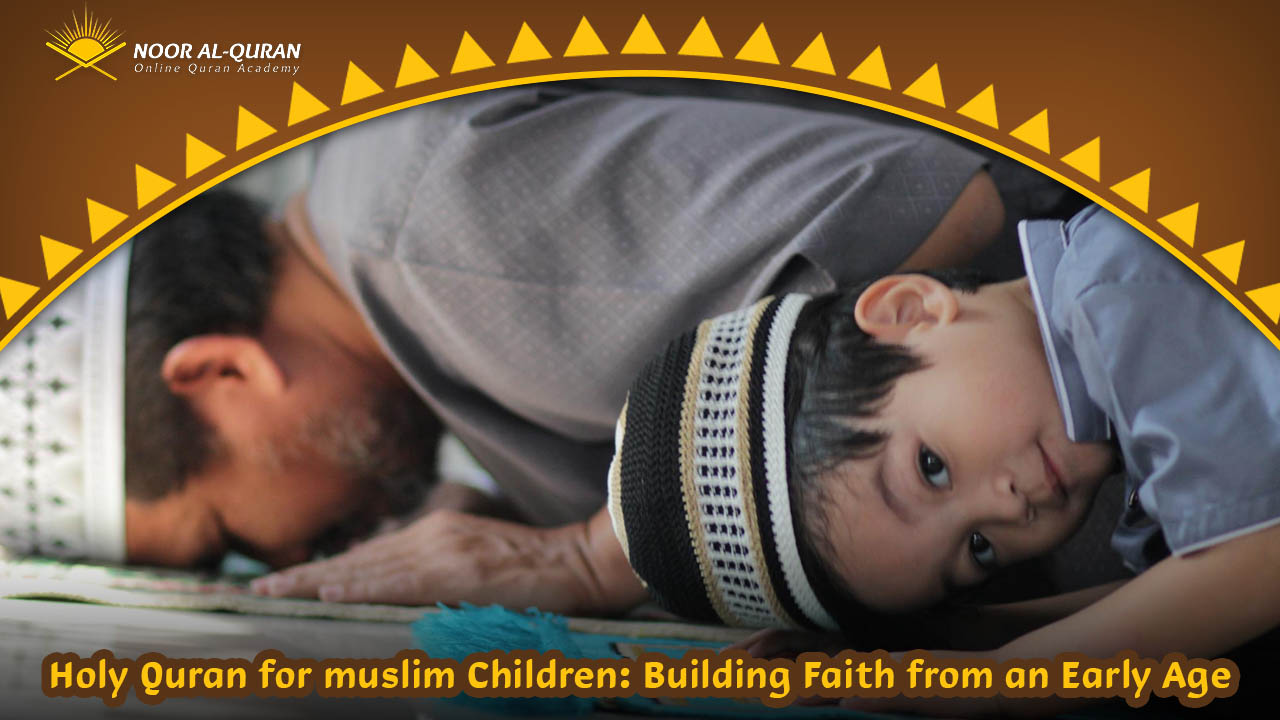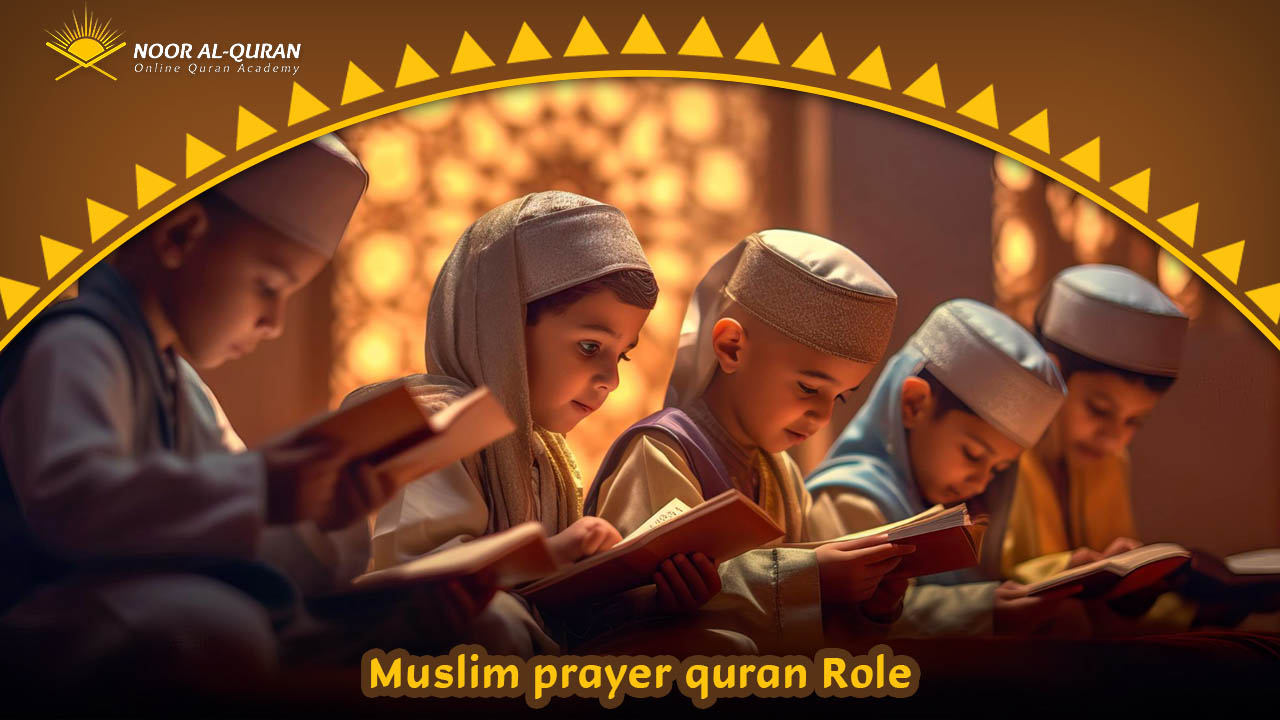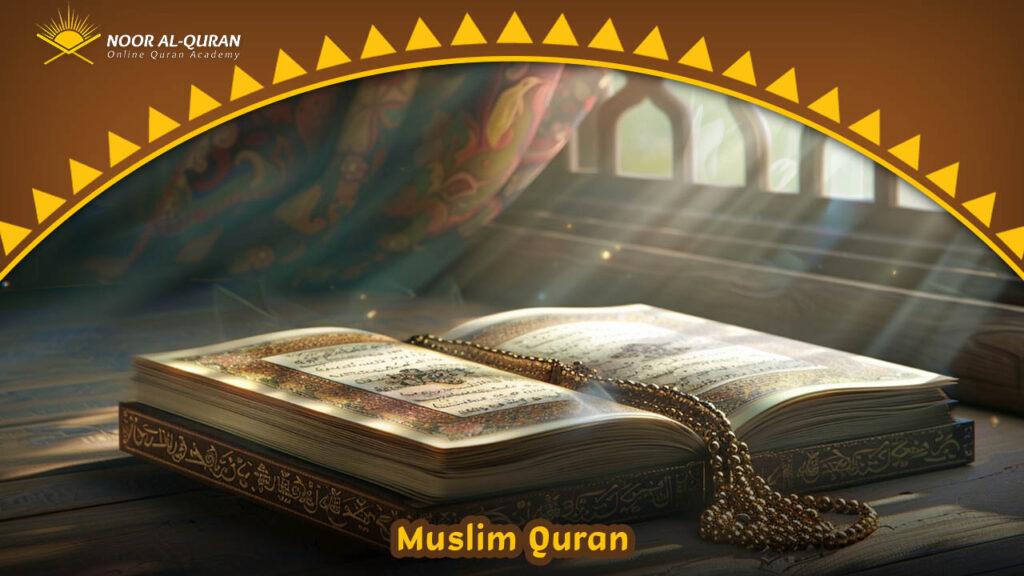Muslim Quran learning is at the heart of every believer’s spiritual journey, guiding Muslims to live by the words of Allah and understand the essence of Islam. At Noor Quran Academy, we are dedicated to making Quran education accessible, engaging, and deeply meaningful for learners of all ages and backgrounds.
Through expert guidance, interactive classes, and a structured curriculum, we help students not only recite the Holy Quran with accuracy but also connect with its timeless wisdom. Whether you are a beginner or an advanced learner, our programs are designed to strengthen your faith, enrich your understanding, and bring the beauty of the Quran into your daily life.
Holy Quran for muslim Children: Building Faith from an Early Age

Teaching children the Quran, however, comes with unique challenges—maintaining their focus, managing their energy, overcoming pronunciation difficulties, and making lessons engaging.
To address these, parents and educators can use creative, structured, and personalized approaches:
- Learning Through Play – Children are naturally energetic, so incorporating games and interactive activities into Quran lessons keeps them engaged while making learning enjoyable.
- Structured Routines for Focus – Setting a clear daily schedule for Islamic studies helps children develop concentration and the ability to complete tasks with discipline.
- Affordable and Accessible Learning – Many valuable Islamic resources are available online for free. At Noor Quran Academy, we also offer a free trial lesson, allowing families to explore our teaching style without financial pressure.
- Encouragement and Confidence-Building – Genuine praise and consistent motivation boost children’s self-esteem, helping them approach Quran learning with enthusiasm and resilience.
- Community Connection – Social interaction with peers through group learning or community events helps children apply Islamic teachings in real-life situations, fostering a sense of belonging to the Ummah.
- Mastering Pronunciation – Using nasheeds, rhymes, and repetition can make mastering Arabic sounds easier and more enjoyable for children, ensuring accurate Quran recitation.
- Step-by-Step Memorization – Assigning small portions of verses along with simple explanations helps children retain what they learn and understand the meaning behind each ayah.
- Simplifying Complex Lessons – Breaking down Islamic studies into age-appropriate steps, such as teaching prayer movements gradually, prevents children from feeling overwhelmed.
Read also:
Noor Quran – Your Path to Quranic Mastery
Unlock the wisdom of the Muslim Quran with Noor Quran’s expert-led online classes. From accurate recitation and Tajweed to deep Tafseer and memorization, we make learning accessible, interactive, and inspiring for all ages. Guided by experienced teachers, you’ll gain not only knowledge but also a stronger connection to your faith. Start today and let the light of the Quran transform your heart and mind—
enroll now and make the Quran a lifelong companion.

Quran Teachings for Muslim Should Know
For every Muslim, understanding and practicing the fundamental teachings of the Quran is essential to living a life rooted in faith. These teachings encompass core beliefs, acts of worship, and principles of moral conduct that shape a Muslim’s relationship with Allah and guide their daily actions. Whether you are a new convert or a lifelong believer, mastering these foundations strengthens your connection to the Quran and deepens your spiritual journey.
The Five Pillars of Islam – The Foundation of Practice
The Quran emphasizes the Five Pillars of Islam as the essential framework for a believer’s life:
- Shahada (Faith): Declaring that “There is no god but Allah, and Muhammad is the Messenger of Allah” affirms one’s belief in the Oneness of Allah and the finality of His Prophet.
- Salah (Prayer): Establishing the five daily prayers connects a Muslim directly with Allah, fostering discipline, gratitude, and spiritual mindfulness.
- Zakat (Charity): Giving a set portion of wealth purifies one’s earnings, supports the needy, and promotes social justice.
- Sawm (Fasting in Ramadan): Abstaining from food, drink, and other physical needs during daylight hours teaches self-control, empathy, and gratitude.
- Hajj (Pilgrimage): Undertaking the pilgrimage to Mecca at least once in a lifetime—if physically and financially able—fulfills a profound act of worship and unity with the global Muslim community.
Learn more: virtual quran courses
The Six Articles of Faith – The Core Beliefs
Alongside the Five Pillars, the Quran guides Muslims to uphold the Six Articles of Faith:
- Belief in Allah: Recognizing Him as the sole Creator, Sustainer, and Ruler of the universe.
- Belief in Angels: Accepting the existence of angels created by Allah to fulfill His commands and record human deeds.
- Belief in the Divine Books: Affirming the revelations sent to the prophets, with the Quran as the final, complete message.
- Belief in the Prophets: Following the guidance of prophets—from Adam and Noah to Moses, Jesus, and Muhammad (peace be upon them)—sent to lead humanity.
- Belief in the Day of Judgment: Understanding that every soul will be held accountable for its actions, motivating righteous living.
- Belief in Divine Decree (Qadr): Trusting that all events occur by Allah’s knowledge and wisdom, whether perceived as good or challenging.
These core Quranic teachings are more than just knowledge—they are a roadmap for living a life of purpose, morality, and devotion. By applying them consistently, a Muslim not only fulfills their religious obligations but also strengthens their spiritual resilience and draws closer to Allah in every aspect of life.
The Holy Quran: A Timeless Guide for Muslims
The Muslim Quran, Islam’s sacred scripture, is the eternal word of Allah revealed to the Prophet Muhammad (peace be upon him) over a period of 23 years. Containing 114 suras (chapters) and approximately 6,236 ayats (verses), it stands as the ultimate source of guidance, law, and moral principles for Muslims around the world. Divided into 30 juz’ (sections) for ease of recitation, the Muslim Quran offers timeless wisdom that continues to inspire believers across generations.
At Noor Quran Academy, we understand that the Quran is not just a book — it is a living guide and a divine light that shapes a Muslim’s faith, character, and daily life. Its teachings transcend time and culture, delivering universal truths about the oneness of God, the sanctity of human life, and the importance of justice, compassion, and morality.
Read also: quran classes online for kids
The Mus’haf – A Physical Reflection of Divine Revelation
The Quran’s written form, known as the mus’haf, is a tangible representation of this sacred revelation. Every detail, from the elegant Arabic calligraphy to the careful arrangement of chapters, reflects the deep reverence Muslims hold for their holy book. While the sacred content never changes, the physical size and design of a mus’haf may vary — some are compact for daily reading, while others are ornate editions kept in mosques or libraries.
Each sura begins with the basmala, “In the name of Allah, the Most Gracious, the Most Merciful,” and is divided into ayats — the foundational units of the Muslim Quran that convey divine instructions, moral lessons, and spiritual guidance.
A Guide for All Generations : For over fourteen centuries, the Quran has been a constant source of comfort, inspiration, and direction. It addresses every aspect of life, from personal spiritual growth to social justice, offering solutions rooted in divine wisdom.
At Noor Quran Academy, we are dedicated to helping students not only recite the Quran but also understand and apply its teachings in daily life. By connecting deeply with the Quran, believers strengthen their faith, refine their character, and draw closer to Allah — making the Muslim Quran a timeless companion for every generation.
Muslim prayer quran Role

Before performing Salah, Muslims must prepare through wudu (ablution) as described in “When you stand to pray, wash your faces and your hands up to the elbows, wipe your heads, and wash your feet up to the ankles” (Quran 5:6). Facing the Qibla—the Kaaba in Mecca—is another essential requirement, as commanded in “Turn your face in the direction of the Sacred Mosque” (Quran 2:144).
The Quran also encourages believers to seek strength and patience through prayer, especially in difficult times: “O you who have believed, seek help through patience and prayer. Indeed, Allah is with the patient” (Quran 2:153). Moreover, communal prayers, particularly Friday Jumu‘ah prayer, are emphasized to foster unity and collective worship among Muslims.
In conclusion, the Muslim Quran is more than just a sacred text—it is a complete guide for life, offering wisdom, comfort, and direction for every aspect of a believer’s journey. At Noor Quran Academy, our mission is to help Muslims worldwide build a strong connection with the Quran through expert teaching, flexible learning options, and a supportive environment.

